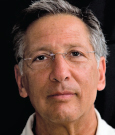More than 35 ASCO members contributed personal essays to a recently published collection of stories about humanism in medicine, including ASCO Past Presidents Paul A. Bunn, Jr, MD, FASCO, and Emil J. Freireich, MD, FASCO, and current President-Elect Julie M. Vose, MD, MBA, FASCO. The Big Casino: America’s Best Cancer Doctors Share Their Most Powerful Stories is a collaboration between Stanley H. Winokur, MD, Medical Director of Axess Oncology and ASCO member, and Vincent Coppola, a journalist and author who was diagnosed with cancer in 2012.
In the interview that follows, Dr. Winokur discusses the book’s contributors, themes, and his own essays. “Young doctors, especially, are going to be inspired by the stories in the book,” he said. “The authors are their mentors, their heroes, being completely real.”
Humanizing Physicians
The author list is impressive. Were you surprised by the response when you asked for contributors?
The doctors who answered the call are some of the busiest doctors in the world. And without fail, they all responded that they were grateful for the opportunity. I believe there are hundreds more doctors who would have contributed. It’s therapeutic to share these stories. I’m looking at creating a website where people can continue to submit their stories as a vehicle to share the gifts we’ve been given.
What guidance did you give to the authors for their contributions?
I personally talked with every author I invited, and I said, “You’re a rock star in the world of medicine. Everyone knows who you are as a scientist and a clinician. I’d like you to write about who you are as a human being.” Patients talk about how grateful they are to their doctors. This book is about our gratitude for our patients, and the precious gifts they’ve given us—gifts of courage, strength, hope, humor, determination, and joy. So the question I asked the authors was, “What have you gotten from your patients?”
Humor and Hope
You contributed two stories to the book. The first, “How to Tell Patients They Have Cancer,” demonstrates a sense of gallows humor. Is that an essential trait when working in oncology?
Yes, absolutely. That story happened when I was in medical school, about 40 years ago, and it shows the intense fear that doctors had of being real. We talked about “neoplasms” and “lesions” because we didn’t know how to tell patients that they had cancer. We didn’t want to use that word. It was our armor, to avoid telling patients they might die. There was a dark humor in the way we discussed it. That dark humor exists today in other ways. As doctors, we very rarely share those kinds of stories with the public because we don’t want to be seen as minimizing someone’s suffering or to be perceived as insincere. The humor is really about our own fear.
If readers take away only one message from the book, what do you hope they understand?
Hope is a precious gift. We should never say to our patients, “There’s nothing else I can do for you.” There might not be any more drugs or therapies we can give them, but we can give them our compassion and our gratitude. We can stand next to them and hold their hands. There is always something we can do.
Dr. Winokur’s hope is that every oncologist and patient will have the opportunity to read The Big Casino. The book is being sold at cost, and no editor or contributor is profiting from its sales. Print and ebook editions are available on Amazon.com; visit thebigcasino.org for a full list of contributors and information about discounted bulk orders for your training program, cancer center, or practice. ■
Originally printed in ASCO Connection. © American Society of Clinical Oncology.
“Beating the Odds in The Big Casino.” ASCO Connection, January 2015: 32-34. All rights reserved.


